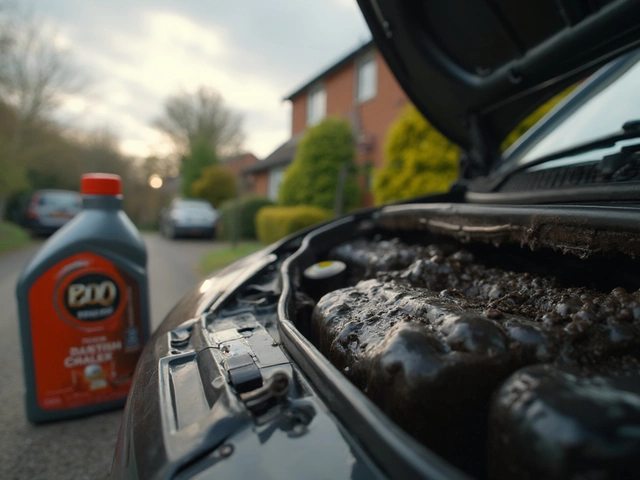Ever wonder how some folks squeeze hundreds of thousands of miles out of their cars without a single major hiccup? It's rarely luck. It's usually because they know when to change their engine oil—and why it matters. Most breakdowns that leave people stranded aren’t fluke “bad car” issues. They're maintenance misses, with overdue oil changes topping the list.
Common Signs Your Engine Oil Needs Changing
It's rare that a car will outright beg you for new oil. More often, it drops hints—sometimes subtle, sometimes not so much. Ignoring these signs is like gambling with your engine’s health. One of the clearest signs crops up right on your dash: the oil warning light. This isn’t your car being needy; it’s pointing out a potential issue with oil pressure—a sign you need to check your oil right away. Low oil levels or degraded oil can trigger this, and waiting things out usually leads to expensive trouble.
Another big red flag is louder engine noise. If your car starts knocking or becomes noticeably noisier than normal, oil isn’t doing its job. It acts as a cushion between moving parts; old or depleted oil means more metal-on-metal action. That’s not just irritating, it’s slowly wrecking your engine from the inside.
If you’ve got a newer vehicle with a service reminder or oil life monitor, don’t ignore it. Cars from the last decade come with sensors and computers tuned to your driving style and engine habits. When it tells you to change the oil, it cares less about mileage and more about actual oil condition.
Dark or gritty oil is another tip-off. Fresh oil is amber and smooth. If, when you pull the dipstick, you see thick, black, or grainy oil, that’s a sign it’s past its prime. Grit basically acts like sandpaper, slowly wearing down your engine's internals.
Burnt oil smell is less common—but very telling. If you notice a hot, acrid smell, that oil is likely breaking down at high temperatures (or leaking onto hot components). Either way, it’s your cue to act fast.
Lastly, sluggish acceleration or stalling at idle can be related. Old oil creates more drag and resistance inside the engine, making your car work harder for every bit of power. Not only does this hurt performance, but it’s also wasting fuel.
Why Regular Oil Changes Matter
Engine oil isn’t just there to keep things slick. It cleans, cools, and cushions your entire engine. Over time, contaminants and combustion byproducts build up in oil. No matter how advanced an oil or additive is, it eventually gets overwhelmed and you lose vital protection. That’s not just marketing—mechanics in Manchester will tell you, plenty of engines die young because the oil wasn’t changed soon enough.
Take a look at synthetic oil versus conventional oil. Synthetics have better resistance to breakdown and keep their lubricating qualities longer. But even the best synthetic oils can’t last forever. The detergents that suspend dirt and carbon will get saturated. If you leave old oil in for too long, sludge starts to form—tiny deposits that cling to important engine parts, clog passageways, and upset oil flow. Once it gets to this stage, even several oil flushes can’t undo the damage.
Regular oil changes actually save you money over time. According to data from the RAC (Royal Automobile Club), around 30% of all engine failures in the UK can be traced to extended oil change intervals and neglect. It's a real blow to get hit with a multi-thousand pound repair bill because you put off a £60 job.
For turbocharged or high-performance engines, the stakes climb even higher. Turbos spin at crazy speeds and run blazing hot, so oil can break down faster. Follow your owner's manual, and if you drive hard or in lots of stop-and-go city traffic, consider halving the recommended interval.
It's not just about engine life, either. Clean oil improves fuel efficiency. By keeping friction down, your engine doesn't have to work as hard to move, which shaves pennies off every litre. That adds up, especially with petrol prices in Manchester pushing £1.55 per litre recently.
| Symptom | What It Means | Suggested Action |
|---|---|---|
| Oil Warning Light | Low oil or low pressure | Check oil level, change if needed |
| Loud Engine Noise | Insufficient lubrication | Inspect oil, change immediately |
| Burnt Oil Smell | Oil breakdown or leaks | Look for leaks, change oil |
| Dark, Gritty Oil | Contaminated oil | Replace oil, check filters |
| Poor Acceleration | Increased engine drag | Change oil, inspect engine |

How to Check If Your Engine Oil Needs Changing
You don’t need to be a mechanic to spot trouble. Anyone can check their engine oil with a bit of practice. Pop the bonnet when your engine is cold, pull out the dipstick, and wipe it on a clean rag or towel. Put it back in and pull it out again—you’re looking for level and colour. If the oil’s below the "min" mark, top it up right away, but don’t just fill and forget. Low oil means your engine might be leaking or burning oil faster than it should. That’s worth investigating.
Hold the dipstick sideways and look at the oil itself. Fresh oil is usually amber, almost like runny honey. If it looks thick, dark, or sludgy—or you spot metal specks—that’s enough reason to book a change soon. Engineered products like synthetic oil might look a bit darker naturally, but you’ll still spot the difference when it’s time is up. If bits or particles show up, your oil filter could be letting stuff through, or your engine might be wearing down from inside. That’s a tip-off you really need to deal with it.
Check your service manual for the manufacturer’s recommended oil change interval. It usually ranges from 5,000 to 10,000 miles, but Manchester’s stop-start traffic and short trips may require a little more diligence. Cold starts in UK winters are also rougher on oil. Short journeys don’t let oil get hot enough to burn off moisture and fuel vapour, so sludge builds up faster.
If you drive an older car, don’t rely on a dash reminder. Keep a little log in your glovebox with dates and mileage for each oil change. It’s old-school, but it saves you from second-guessing and gives proof if you’re ever selling the car.
Don’t forget the oil filter. An old, clogged filter is almost as bad as dirty oil. Filters trap debris, but fill up over time, letting more grime circulate through your engine. Always change the filter when you change the oil, no matter what anyone says.
Got a diesel? Oil in diesels gets contaminated with soot quicker than in petrol engines. Even if the oil looks dark, it might be just fine, but never ignore the intervals. High-mileage oils or diesels often benefit from slightly more frequent changes.
Tips for Making Your Engine Oil Last Longer
A little care can save you from big repairs. First, always use the oil grade and type recommended in your car’s handbook. Modern engines need the right oil for optimum protection and fuel economy, and going for a generic brand can do more harm than good. If your handbook says 5W-30 synthetic, stick to it.
Buy quality filters. Cheap oil filters may save a couple of quid, but they can clog or fall apart, letting crud through that can damage your engine. Go with trusted brands or the original parts from the dealership, especially for newer or higher-end models.
Warm up your car gently—especially in winter. Don’t rev hard straight after starting. Give the oil a chance to circulate, especially when it’s cold, so bearings and pistons aren’t running dry.
Stick to a routine. Mark a date on your calendar, or set a reminder on your phone—life in Manchester gets busy, so it’s easy to forget. Engine oil isn’t something to put off until next month.
Drive moderately if your last oil change is overdue. Avoid pulling trailers, driving flat-out on the motorway, or hammering the clutch on steep city hills.
- If your car sits for long periods, oil can still degrade. Change the oil at least once a year even if you haven’t put many miles on. Modern oils last longer than before, but condensation and breakdown don’t stop just because you’re not racking up miles.
- Watch for leaks—check for oily spots under your car, especially after it’s been parked overnight. Promptly fixing leaks stops oil loss, mess, and environmental harm.
- Keep an emergency quart of oil in the boot. Even the best-maintained cars can burn a little oil between changes, especially as they age or with high-mileage engines.
One more not-so-obvious tip: every so often, have your car’s PCV (positive crankcase ventilation) valve checked. A clogged PCV can build up pressure and cause oil leaks, or increase sludge. It’s a cheap fix that solves issues before they get expensive.
Manchester garages have seen it all—engines wrecked by putting things off just a little too long. Make oil changes as routine as your morning coffee, and your car will reward you with quieter operation, fewer surprises, and years of faithful service. The best engines aren’t the ones with the flashiest badges or the biggest price tag. They’re the ones whose owners looked after them with engine oil change right on time. It beats replacing the engine, that’s for sure.


